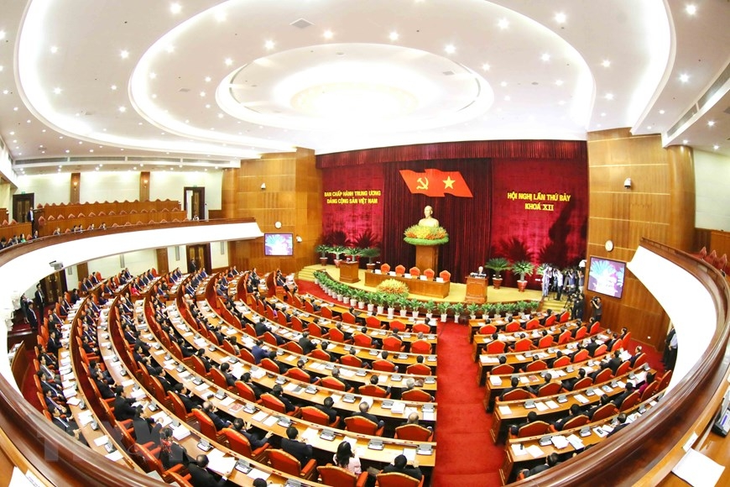(VOVWORLD) - At the August 21 meeting of the Subcommittee for Personnel Affairs of the 14th National Party Congress, General Secretary and President To Lam highlighted the critical role of cadres in every revolutionary period, across all fields and localities. Since the 13th National Party Congress, significant progress has been made in cadre work, particularly in the rotation and assignment of key cadres. This strategy has emerged as a major solution to reforming the Party's personnel work in the current context.
 (Photo: dangcongsan.vn) (Photo: dangcongsan.vn) |
After more than three years of implementing the Resolution of the 13th National Party Congress, localities have actively embraced the policy of cadre rotation. Each rotated cadre has made a notable impact, leading to positive changes in grassroots socio-economic activities.
Changes at the grassroots level
Lào Cai province has 138 communes, wards, and towns in ethnic minority and mountainous area, 66 of which are particularly disadvantaged. Over the past few years, the rotation of staff to grassroots positions has been prioritized.
In 2019, young cadre Dang Cong Huan , previously District Deputy Chief Inspector, was appointed Chairman of the People's Committee of Lung Khau Nhin commune, one of the poorest communes in Muong Khuong district and Lao Cai province.
The commune's leadership and Huan, with his background in economics, have encouraged residents to convert unproductive farmland into cultivation areas for key crops like tea and other local specialties. This effort has reduced the commune’s poverty rate by more than 10% annually since his appointment. Huan said:
"The tea-growing area in the commune has expanded to 400 hectares, with 200 hectares already yielding regular income. Additionally, the commune has developed growing areas for tangerine, banana, pear, peach, and plum trees, which are now beginning to be harvested," said Huan.
In Si Ma Cai district, Secretary of the district Party Committee Ha Duc Minh said that since the start of the current term, the district has rotated seven cadres from the district to the commune level and six cadres between communes. This approach has not only re-motivated the cadres but has ensured that key cadres are not local residents and do not hold a position for more than two terms.
Minh said: "The result has been more transparent direction and a positive working atmosphere at the local Party Committee and government level. Rotated cadres have effectively met the demands of their new roles."
Beyond improving local conditions, the rotation of key cadres provides an opportunity for them to gain experience, face challenges, and grow. In Thach Ha district, Ha Tinh province, the rotation and transfer of cadres has been done in a coordinated manner closely aligned with cadre planning, training, and capacity building.
Nguyen Thi Nguyet, Secretary of the Thach Ha district Party Committee, said: "Rotation gives cadres an environment to practice, strive, and develop comprehensively. The district Party Committee's Standing Board issues an annual rotation plan, selecting young cadres with the qualities, capacity, and reputation to strengthen grassroots leadership, particularly in challenging and key areas. This practical experience helps cadres continue their education, strive for excellence, and train effectively."
Party’s strategy on cadre rotation
The Communist Party of Vietnam has consistently prioritized cadre work. Resolution 26 of the 7th Plenum of 12th Party Central Committee emphasized building a contingent of cadres at all levels, especially at the strategic level, with the necessary qualities, capacity, and reputation to fulfill their tasks. By 2025, the Party aims to ensure that no provincial-level Party Secretary is a local resident. The 13th Politburo issued Regulation 65, reinforcing the policy of appointing non-local leaders at the provincial and district level.
Since the beginning of the tenure of the 13th Party Central Committee, 40 central personnel have been assigned as provincial Party Secretaries, and 29 provincial People's Committee Chairpersons are not local residents. The Politburo has also transferred several non-local Secretaries who advanced in their career in various provinces and cities to new positions at the central level.
Associate Professor Dr. Le Van Cuong, Deputy Director of the Institute of Party Building at the Ho Chi Minh National Academy of Politics, said: "The policy of rotating cadres and appointing non-local leaders has been increasingly implemented in recent terms, creating a positive ripple effect. It enhances all stages of cadre work, sending cadres to grassroots positions where they can be tested and trained in practical environments. Direct engagement with the masses and real-world work allows cadres to demonstrate their actual capacity. Additionally, this approach provides opportunities for cadres to improve themselves."
Rotating cadres is a sound policy that aligns with the principles of development. It serves as a crucial step in the ongoing training and development of cadres, providing them with the necessary conditions and environments to gain practical experience, strive for excellence, and grow quickly and comprehensively. This approach represents a significant breakthrough in the personnel work of the Communist Party of Vietnam, which aims to cultivate leaders with willpower and experience in grassroots practice.